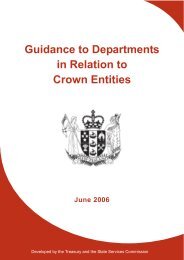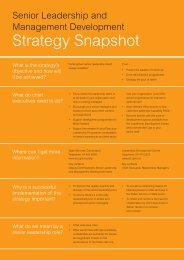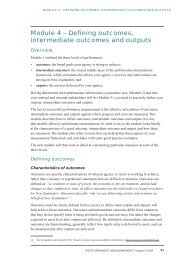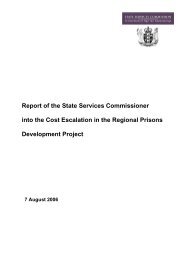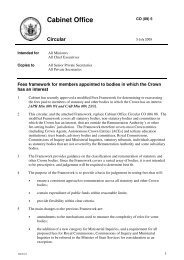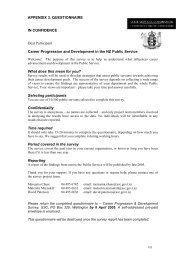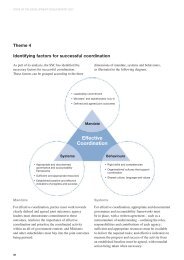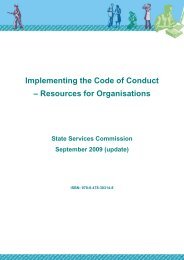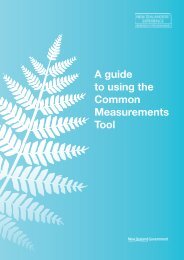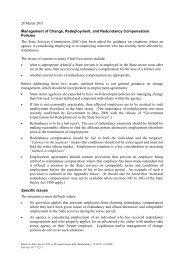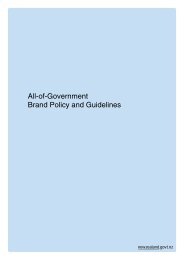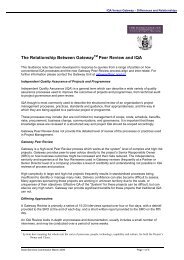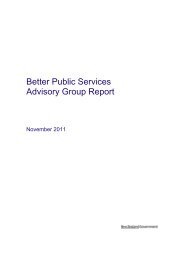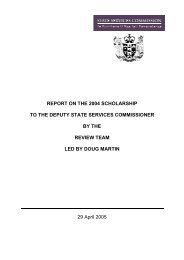Public Satisfaction with Service Quality 2007: The Kiwis Count Survey
Public Satisfaction with Service Quality 2007: The Kiwis Count Survey
Public Satisfaction with Service Quality 2007: The Kiwis Count Survey
Create successful ePaper yourself
Turn your PDF publications into a flip-book with our unique Google optimized e-Paper software.
<strong>Public</strong><br />
<strong>Satisfaction</strong><br />
<strong>with</strong> <strong>Service</strong><br />
<strong>Quality</strong><br />
<strong>2007</strong>:<br />
<strong>The</strong> <strong>Kiwis</strong><br />
<strong>Count</strong><br />
<strong>Survey</strong>
<strong>The</strong> <strong>Kiwis</strong> <strong>Count</strong> survey and this booklet contain material<br />
from Citizens First, used under licence and reproduced<br />
<strong>with</strong> the permission of the Executive Director of the<br />
Institute for Citizen-Centred <strong>Service</strong>.<br />
ISBN 978-0-478-30341-4 (printed, bound version)<br />
ISBN 978-0-478-30342-1 (PDF online version)<br />
Crown copyright 2008
<strong>Public</strong> <strong>Satisfaction</strong> <strong>with</strong> <strong>Service</strong> <strong>Quality</strong> <strong>2007</strong>: <strong>The</strong> <strong>Kiwis</strong> <strong>Count</strong> <strong>Survey</strong><br />
1<br />
Foreword<br />
Since the launch of the Development Goals for the State <strong>Service</strong>s in<br />
2005, we have been working <strong>with</strong> agencies across the State <strong>Service</strong>s to<br />
build a shared understanding of what it means to have ‘a system of<br />
world class professional State <strong>Service</strong>s serving the government of the day<br />
and meeting the needs of New Zealanders’, and measuring our progress<br />
toward that overall goal.<br />
<strong>The</strong> only way we can accurately assess how well we are meeting<br />
the needs of New Zealanders is to go out and ask them. We did just that<br />
in <strong>2007</strong> <strong>with</strong> the <strong>Kiwis</strong> <strong>Count</strong> survey, a survey of 6,500 people around<br />
the country, which asked them what they thought of their government<br />
services. This booklet is the result of that research.<br />
We chose a methodology that would allow us to compare ourselves<br />
against the leaders in this field, the Canadian government; where a<br />
similar survey has been running for the last decade. While I am very<br />
encouraged by the results of the first New Zealand survey, I think the<br />
real achievement has been in establishing a benchmark against which we<br />
can target and track our improvement in the coming years.<br />
<strong>The</strong> results do show that our State <strong>Service</strong>s are on the right track,<br />
but they also show that there is room for improvement. We know, of<br />
course, that satisfaction is only part of the story about how well our<br />
services are performing. We also know results will sometimes vary<br />
between services because of the nature of those services. However,<br />
measuring satisfaction can provide us <strong>with</strong> valuable information about<br />
service quality and whether this is improving. New Zealanders have<br />
high standards; it is our job to use the information in this report to<br />
ensure that we meet those standards.<br />
22605 <strong>Kiwis</strong> <strong>Count</strong> 3-0LC.indd 1 27/3/08 12:05:29 PM
2<br />
I would like to acknowledge the effort of the many people who<br />
contributed to the <strong>Kiwis</strong> <strong>Count</strong> survey. First of all, the New Zealanders<br />
who completed the survey. <strong>The</strong>ir impressive response rate shows that<br />
they want their views on government services to be heard. I would also<br />
like to thank the Institute for Citizen-Centred <strong>Service</strong> in Canada for<br />
their help and support in enabling us to adapt their Citizens First survey.<br />
And I would like to thank my own staff, who have so ably managed<br />
the <strong>Kiwis</strong> <strong>Count</strong> project and produced this booklet.<br />
Mark Prebble<br />
State <strong>Service</strong>s Commissioner<br />
22605 <strong>Kiwis</strong> <strong>Count</strong> 3-0LC.indd 2 27/3/08 12:05:29 PM
<strong>Public</strong> <strong>Satisfaction</strong> <strong>with</strong> <strong>Service</strong> <strong>Quality</strong> <strong>2007</strong>: <strong>The</strong> <strong>Kiwis</strong> <strong>Count</strong> <strong>Survey</strong><br />
3<br />
Introduction<br />
‘<strong>Public</strong> <strong>Satisfaction</strong> <strong>with</strong> <strong>Service</strong> <strong>Quality</strong> <strong>2007</strong>: <strong>The</strong> <strong>Kiwis</strong> <strong>Count</strong> <strong>Survey</strong>’<br />
is the first national all-of-government survey to ask New Zealanders<br />
about their experiences and perceptions of public services 1 . <strong>The</strong>ir views<br />
have provided us <strong>with</strong> a wealth of information on what we are doing<br />
well and where we can improve services. <strong>The</strong> survey tells us how<br />
satisfied New Zealanders are <strong>with</strong> public services, how much they trust<br />
public services and how public services compare <strong>with</strong> the private sector.<br />
<strong>The</strong> <strong>Kiwis</strong> <strong>Count</strong> survey was carried out in <strong>2007</strong> by <strong>The</strong> Nielsen<br />
Company for the State <strong>Service</strong>s Commission (SSC). <strong>The</strong>y surveyed 6,500<br />
New Zealanders, <strong>with</strong> a response rate of 61%: extremely high for a<br />
voluntary postal survey in New Zealand. This means we can have a high<br />
level of confidence in the findings of this survey and it also shows that<br />
New Zealanders want their views on public services to be heard.<br />
<strong>The</strong> real value of this survey lies in agencies using the results<br />
to make targeted improvements to services that show we are listening<br />
to the views of New Zealanders. <strong>Satisfaction</strong> <strong>with</strong> public services is<br />
a complex area: it is harder to achieve satisfaction for some types of<br />
services than others and it is, of course, only one aspect of public<br />
value. However, satisfaction is an important indication of service<br />
quality and we should aim to improve satisfaction ratings over time.<br />
This booklet summarises some of the main results and explains what<br />
they mean for public services. It also sets out some of the actions we<br />
can take to improve services. Detailed analysis of the results is set<br />
out in a research report which is available on the SSC website<br />
(www.ssc.govt.nz/kiwis-count-research-survey).<br />
1<br />
‘<strong>Public</strong> services’ is used throughout this booklet and other publications about the <strong>Kiwis</strong> <strong>Count</strong> survey as the<br />
term most widely understood by New Zealanders. For the purposes of the survey, ‘public services’ refers<br />
to the list of 42 services set out at the end of this booklet. This list broadly represents services provided by<br />
central and local government, tertiary education institutions and kindergartens.<br />
22605 <strong>Kiwis</strong> <strong>Count</strong> 3-0LC.indd 3 27/3/08 12:05:29 PM
4<br />
<strong>The</strong>se are some highlights of the survey<br />
– <strong>Satisfaction</strong> <strong>with</strong> public services in New Zealand is equal<br />
<strong>with</strong> Canada. Canadians are among the world leaders in providing<br />
citizen-centred public services and have been carrying out public<br />
service satisfaction surveys since 1998. <strong>The</strong> <strong>Kiwis</strong> <strong>Count</strong> survey<br />
uses the same methodology as the Canadian surveys, allowing us<br />
to make direct comparisons. <strong>The</strong> results show that satisfaction <strong>with</strong><br />
New Zealand public services is 68%, equal <strong>with</strong> Canada’s score in<br />
their most recent survey.<br />
– We already know what’s most important to New Zealanders,<br />
now we know how public services are performing in<br />
these areas. <strong>The</strong> ‘Drivers <strong>Survey</strong>’, published in July <strong>2007</strong>,<br />
identified the six main factors, or drivers, that have the greatest<br />
impact on satisfaction <strong>with</strong> services, for example ‘you were treated<br />
fairly’. <strong>The</strong> <strong>Kiwis</strong> <strong>Count</strong> survey tells us how services are<br />
performing against these drivers, which means that service<br />
improvements can be targeted where they are most likely to<br />
increase satisfaction.<br />
– Ensuring services meet the expectations of New Zealanders<br />
is the most effective way of improving satisfaction overall.<br />
‘<strong>The</strong> service experience met your expectations’ is the most<br />
important driver of satisfaction for New Zealanders. <strong>The</strong>refore,<br />
improving performance against this driver is likely to have the<br />
greatest impact on satisfaction.<br />
– <strong>Public</strong> services perform well on having competent staff,<br />
treating New Zealanders fairly and keeping promises, but<br />
less well on providing good value for tax dollars spent.<br />
Three-quarters of New Zealanders agreed that on their most recent<br />
22605 <strong>Kiwis</strong> <strong>Count</strong> 3-0LC.indd 4 27/3/08 12:05:29 PM
<strong>Public</strong> <strong>Satisfaction</strong> <strong>with</strong> <strong>Service</strong> <strong>Quality</strong> <strong>2007</strong>: <strong>The</strong> <strong>Kiwis</strong> <strong>Count</strong> <strong>Survey</strong><br />
5<br />
service experience, staff were competent, but only just over half<br />
agreed that their most recent service experience was an example<br />
of good value for tax dollars spent.<br />
– <strong>The</strong>re is no significant difference between M – aori views on<br />
public services and the views of New Zealanders as a whole.<br />
– <strong>The</strong> telephone is the second most common way of contacting<br />
public services, but this method of contact has the lowest<br />
satisfaction levels. 60% of New Zealanders are satisfied <strong>with</strong><br />
calling public services on the telephone, compared <strong>with</strong> 75%<br />
satisfaction <strong>with</strong> visiting an office or service location.<br />
– New Zealanders’ experiences of public services tend to be<br />
more positive than their perceptions. New Zealanders generally<br />
rate their most recent service experience more highly than their<br />
experiences of public services overall. <strong>The</strong>y also rate their<br />
experiences of public services more highly than similar private sector<br />
services, even though they do not think that the public sector as a<br />
whole performs better than the private sector. And New Zealanders<br />
trust individual public servants and services more highly than public<br />
services overall.<br />
– <strong>The</strong> <strong>Kiwis</strong> <strong>Count</strong> survey provides us <strong>with</strong> a valuable<br />
opportunity to improve services and we need to act on the<br />
results. SSC has developed a Common Measurements Tool, which<br />
provides a set of common questions for agencies to use for their own<br />
satisfaction surveys, consistent <strong>with</strong> the approach used for the <strong>Kiwis</strong><br />
<strong>Count</strong> survey. SSC wants agencies to use this. Agencies also need to<br />
engage <strong>with</strong> their own staff and staff in other agencies to identify<br />
ways of improving services, including setting up Communities of<br />
Practice to share expertise and information on what works.<br />
22605 <strong>Kiwis</strong> <strong>Count</strong> 3-0LC.indd 5 27/3/08 12:05:29 PM
6<br />
Findings<br />
International benchmarks<br />
In 2005/6, SSC looked at public satisfaction surveying in a number of<br />
other countries and found that Canada has developed a highly successful<br />
approach through its national all-of-government satisfaction surveys,<br />
called Citizens First, which are carried out every two years. Importantly,<br />
Canada can show that it has acted on the research findings and levels of<br />
satisfaction have consistently improved since 1998. Canada is highly<br />
ranked internationally for its citizen-centred services 2 . SSC purchased the<br />
intellectual property licence for Citizens First and adapted it for the <strong>Kiwis</strong><br />
<strong>Count</strong> survey. <strong>The</strong> <strong>Kiwis</strong> <strong>Count</strong> survey shows that, at 68%, satisfaction<br />
<strong>with</strong> New Zealand public services is equal <strong>with</strong> Canada’s 2005 Citizens<br />
First survey (the most recently available results). This is a good result for<br />
New Zealand public services, but we can always do better and the survey<br />
identifies areas where improvements should be focussed.<br />
Drivers of satisfaction<br />
<strong>The</strong> Drivers <strong>Survey</strong>, published in July <strong>2007</strong>, identified the drivers that have<br />
the greatest impact on New Zealanders’ satisfaction <strong>with</strong> public services.<br />
Drivers of satisfaction <strong>with</strong> service quality<br />
– <strong>The</strong> service experience met your expectations<br />
– Staff were competent<br />
– Staff kept their promises – that is, they did what they said they<br />
would do<br />
– You were treated fairly<br />
– You feel your individual circumstances were taken into account<br />
– It’s an example of good value for tax dollars spent<br />
2<br />
For example, see the Accenture report <strong>2007</strong> Leadership in Customer <strong>Service</strong>: Delivering on the Promise,<br />
www.accenture.com.<br />
22605 <strong>Kiwis</strong> <strong>Count</strong> 3-0LC.indd 6 27/3/08 12:05:29 PM
<strong>Public</strong> <strong>Satisfaction</strong> <strong>with</strong> <strong>Service</strong> <strong>Quality</strong> <strong>2007</strong>: <strong>The</strong> <strong>Kiwis</strong> <strong>Count</strong> <strong>Survey</strong><br />
7<br />
Not all the drivers are equal: ‘the service experience met your expectations’<br />
accounts for nearly one third of satisfaction <strong>with</strong> public services.<br />
<strong>The</strong> <strong>Kiwis</strong> <strong>Count</strong> survey measured satisfaction <strong>with</strong> public services<br />
against the six main drivers, shown in the graph below.<br />
p e r f o r m a n c e o f p u b l i c s e rv i c e s o n d r i v e r s o f s at i s fa c t i o n w i t h s e rv i c e q u a l i t y<br />
% Total Disagree<br />
% Neutral<br />
% Total Agree<br />
<strong>The</strong> service experience<br />
met your expectations<br />
Staff were competent<br />
Staff kept their promises<br />
You were treated fairly<br />
You feel your individual circumstances<br />
were taken into account<br />
It’s an example of good value<br />
for tax dollars spent<br />
– <strong>Public</strong> services perform best on ‘staff were competent’, <strong>with</strong><br />
three-quarters of New Zealanders agreeing that this was the case<br />
on their most recent service experience.<br />
– Performance on ‘the service experience met your expectations’ is<br />
not as good. Because this is the most important driver, improving<br />
performance on this would have the greatest impact on satisfaction.<br />
22605 <strong>Kiwis</strong> <strong>Count</strong> 3-0LC.indd 7 27/3/08 12:05:29 PM
8<br />
– However, we also need to address the worst performing drivers:<br />
only slightly more than half of respondents agreed that their most<br />
recent service experience was ‘an example of good value for tax<br />
dollars spent’. ‘You feel your individual circumstances were taken<br />
into account’ also scored less well than other drivers.<br />
<strong>The</strong> survey asked New Zealanders about the public services they had<br />
used in the last 12 months and the service they had used most recently.<br />
<strong>The</strong> results show that New Zealanders’ satisfaction <strong>with</strong> their most<br />
recent service experience tends to be higher than their overall satisfaction<br />
<strong>with</strong> services used in the last 12 months: 68% were satisfied <strong>with</strong> their<br />
most recent service experience and only 62% were satisfied <strong>with</strong> services<br />
experienced over the last 12 months.<br />
Performance by service grouping<br />
<strong>Service</strong>s were categorised into nine service groupings in order to provide<br />
results for similar services and to help identify broad areas for<br />
improvements. A list of the services in each service grouping is set out<br />
at the end of this booklet. <strong>The</strong> results have not been broken down into<br />
individual services and agencies because this would have made the<br />
results too complex and it was not the intention to produce league tables<br />
of results. <strong>The</strong> Common Measurements Tool described later in this<br />
booklet will allow agencies to carry out their own client satisfaction<br />
surveys which are comparable <strong>with</strong> the <strong>Kiwis</strong> <strong>Count</strong> survey.<br />
<strong>The</strong> graph following shows New Zealanders’ satisfaction <strong>with</strong> their<br />
most recent service experience by service grouping. <strong>Satisfaction</strong> is<br />
highest for ‘environment and recreation’ and ‘motor vehicle’ services.<br />
‘Education and training’, ‘health’, ‘local government’ and ‘passports and<br />
22605 <strong>Kiwis</strong> <strong>Count</strong> 3-0LC.indd 8 27/3/08 12:05:30 PM
<strong>Public</strong> <strong>Satisfaction</strong> <strong>with</strong> <strong>Service</strong> <strong>Quality</strong> <strong>2007</strong>: <strong>The</strong> <strong>Kiwis</strong> <strong>Count</strong> <strong>Survey</strong><br />
9<br />
citizenship’ are all rated well. <strong>Satisfaction</strong> is lower for ‘social assistance’,<br />
while fewer than half of New Zealanders are satisfied <strong>with</strong> ‘taxation and<br />
business services’.<br />
s at i s fa c t i o n l e v e l s w i t h m o s t r e c e n t s e r v i c e e x p e r i e n c e b y s e r v i c e g r o u p i n g s (%)<br />
Total<br />
Environment & Recreation<br />
68<br />
79<br />
Motor Vehicle<br />
Education & Training<br />
Health<br />
Local Government<br />
Passports & Citizenship<br />
Justice & Security<br />
77<br />
75<br />
74<br />
73<br />
72<br />
68<br />
Social Assistance<br />
Taxation & Business <strong>Service</strong>s<br />
52<br />
42<br />
22605 <strong>Kiwis</strong> <strong>Count</strong> 3-0LC.indd 9 27/3/08 12:05:30 PM
10<br />
Performance on the drivers by service grouping<br />
<strong>The</strong> survey results have been broken down to show how each service<br />
grouping performed against the drivers of satisfaction.<br />
p e r f o r m a n c e o n d r i v e r s o f s at i s fa c t i o n w i t h s e rv i c e q u a l i t y b y<br />
s e rv i c e g r o u p i n g (%)<br />
Total<br />
Environment<br />
&<br />
Recreation<br />
Motor<br />
Vehicle<br />
Education<br />
& Training<br />
Health Local Govt Passports<br />
& Citizenship<br />
Justice &<br />
Security<br />
Social Taxation &<br />
Assistance Business<br />
<strong>Service</strong>s<br />
<strong>Satisfaction</strong> 68 79 77 75 74 73 72 68 52 42<br />
<strong>The</strong> service<br />
met your<br />
expectations<br />
Staff were<br />
competent<br />
Staff kept their<br />
promises<br />
You were<br />
treated fairly<br />
You feel your<br />
individual<br />
circumstances<br />
were taken<br />
into account<br />
It’s an example<br />
of good value<br />
for tax dollars<br />
spent<br />
66 85 76 68 71 71 68 69 52 44<br />
75 90 84 76 81 76 80 79 58 59<br />
70 83 79 69 75 73 76 69 58 56<br />
73 75 81 78 81 72 70 75 60 60<br />
63 71 65 66 77 61 55 71 51 50<br />
55 56 38 59 70 69 20 62 54 37<br />
<strong>The</strong> survey shows where agencies providing services <strong>with</strong>in the service<br />
groupings might focus improvements in order to increase satisfaction.<br />
At the end of this booklet are set out some of the ways agencies can use<br />
these findings to focus on making improvements in these areas, such as<br />
using the Common Measurements Tool and setting up Communities<br />
of Practice.<br />
22605 <strong>Kiwis</strong> <strong>Count</strong> 3-0LC.indd 10 27/3/08 12:05:30 PM
<strong>Public</strong> <strong>Satisfaction</strong> <strong>with</strong> <strong>Service</strong> <strong>Quality</strong> <strong>2007</strong>: <strong>The</strong> <strong>Kiwis</strong> <strong>Count</strong> <strong>Survey</strong><br />
11<br />
<strong>Public</strong> and private sector<br />
<strong>The</strong> survey looked at how New Zealanders rate public services in<br />
comparison <strong>with</strong> similar private sector services. <strong>The</strong> results show that:<br />
– New Zealanders expect public services to be higher quality than<br />
the private sector<br />
– but they do not think that the overall quality of public services<br />
is higher than the private sector<br />
– and they do not think that public services have a more difficult<br />
task than the private sector.<br />
<strong>The</strong> survey also asked New Zealanders about their satisfaction <strong>with</strong> a<br />
range of non-government services used in the last 12 months including<br />
banks, insurance companies and telephone companies. <strong>The</strong>se services<br />
were selected because they are in some ways comparable <strong>with</strong> public<br />
services. Overall, 58% of New Zealanders were satisfied <strong>with</strong> the<br />
non-government services they had experienced over the last 12 months,<br />
compared <strong>with</strong> 62% who were satisfied <strong>with</strong> public services experienced<br />
over the last 12 months.<br />
<strong>The</strong>se seemingly contradictory findings suggest that New<br />
Zealanders’ experiences of public services tend to be more positive than<br />
their perceptions. New Zealanders do not think that the overall quality<br />
of public services is higher than the private sector, however when asked<br />
about their specific service experiences, their satisfaction ratings <strong>with</strong><br />
public services are higher than non-government services.<br />
Trust in public services<br />
We think that when people lose trust in public services, they do not<br />
seek the help they are entitled to, they do not provide information<br />
22605 <strong>Kiwis</strong> <strong>Count</strong> 3-0LC.indd 11 27/3/08 12:05:30 PM
12<br />
needed for delivering effective services, they resist paying tax and<br />
become increasingly resentful of public services. To increase New<br />
Zealanders’ trust in public services, we need to understand the factors<br />
that most influence, or drive, trust. As <strong>with</strong> satisfaction, this will enable<br />
managers to focus resources on the factors that have the most potential<br />
to increase trust. <strong>The</strong> Drivers <strong>Survey</strong>, as well as identifying drivers of<br />
satisfaction, also identified five drivers of trust in public services.<br />
Drivers of trust in public services<br />
– You have confidence that public servants do a good job<br />
– <strong>The</strong> public service provides services that meet your needs<br />
– <strong>Public</strong> servants treat people fairly<br />
– <strong>The</strong> public service keeps its promises – that is, it does what it<br />
says it will do<br />
– <strong>The</strong> public service admits responsibility when it makes mistakes<br />
<strong>The</strong> <strong>Kiwis</strong> <strong>Count</strong> survey asked about trust in public services. Overall,<br />
29% of New Zealanders agree that they trust public services, and<br />
just under half (49%) are neutral about their trust in public services.<br />
This means that three-quarters of New Zealanders either agree that they<br />
trust public services overall, or are neutral on trust. Less than 25%<br />
express distrust. Not<strong>with</strong>standing this, the results show that there is<br />
significant potential to improve how public services perform on trust<br />
(compared <strong>with</strong> satisfaction). On the individual drivers of trust, public<br />
services perform best on ‘the public service provides services that meet<br />
your needs’ and least well on ‘the public service admits responsibility<br />
when it makes mistakes’, <strong>with</strong> nearly half of New Zealanders<br />
disagreeing that this is the case.<br />
22605 <strong>Kiwis</strong> <strong>Count</strong> 3-0LC.indd 12 27/3/08 12:05:30 PM
<strong>Public</strong> <strong>Satisfaction</strong> <strong>with</strong> <strong>Service</strong> <strong>Quality</strong> <strong>2007</strong>: <strong>The</strong> <strong>Kiwis</strong> <strong>Count</strong> <strong>Survey</strong><br />
13<br />
<strong>The</strong> survey also asked New Zealanders about trust in relation to their most<br />
recent public service experience. This is significantly higher than their trust<br />
overall, in fact over two thirds of New Zealanders trusted the public service<br />
to do what was right on their most recent service experience.<br />
t r u s t in p u b l i c s e rv i c e s: o v e r a l l t r u s t c o m pa r e d w i t h t r u s t o n m o s t r e c e n t<br />
s e rv i c e e x p e r i e n c e<br />
Overall trust in the<br />
public services<br />
22 12 49 20 29 67<br />
Overall you can trust public<br />
services to do what is right<br />
(most recent experience)<br />
Disagree Neutral Agree<br />
Again, this indicates that New Zealanders’ experiences tend to be more<br />
positive than their perceptions. However, the results show it is<br />
important for public services to increase overall levels of trust.<br />
M aori –<br />
<strong>The</strong> results show that there is very little difference between M – aori<br />
views on public services and the views of New Zealanders overall.<br />
Sixty one per cent of M – aori were satisfied <strong>with</strong> services used in the last<br />
12 months, compared <strong>with</strong> 62% of all New Zealanders, and there was<br />
very little variation in satisfaction <strong>with</strong> the different service groupings.<br />
On the drivers of satisfaction, results for M – aori are similar to New<br />
Zealanders as a whole, including on ‘you were treated fairly’, the most<br />
important driver of satisfaction for M – aori.<br />
22605 <strong>Kiwis</strong> <strong>Count</strong> 3-0LC.indd 13 27/3/08 12:05:30 PM
14<br />
Methods of contact<br />
New Zealanders were asked how they had contacted the public service<br />
they had used most recently.<br />
– <strong>The</strong> most common method of contact is to visit an office or<br />
location (47%).<br />
– <strong>The</strong> second most common method of contact is calling on the<br />
telephone (24%).<br />
– Using websites or emails is relatively uncommon, <strong>with</strong> only 4% of<br />
New Zealanders using a website to contact a public service and<br />
only 3% using email. However, it may be that when answering the<br />
survey, New Zealanders did not consider using a website as<br />
‘contacting’ a service.<br />
New Zealanders were also asked about their satisfaction <strong>with</strong> the method<br />
of contact they had used. Three-quarters of New Zealanders are satisfied<br />
<strong>with</strong> visiting an office or location, the most commonly used method.<br />
However, calling on the telephone, the second most common method,<br />
has the lowest satisfaction rating, at 60%.<br />
Because calling on the telephone has a low satisfaction rating,<br />
further analysis was carried out on the drivers of satisfaction <strong>with</strong><br />
telephone services, which showed that improvements could be made in<br />
the following two areas in particular:<br />
– the service experience met your expectations, and<br />
– the amount of time it took to get the overall service was reasonable.<br />
22605 <strong>Kiwis</strong> <strong>Count</strong> 3-0LC.indd 14 27/3/08 12:05:30 PM
<strong>Public</strong> <strong>Satisfaction</strong> <strong>with</strong> <strong>Service</strong> <strong>Quality</strong> <strong>2007</strong>: <strong>The</strong> <strong>Kiwis</strong> <strong>Count</strong> <strong>Survey</strong><br />
15<br />
... and more<br />
<strong>The</strong> research report includes more detail on the methodology used for<br />
the <strong>Kiwis</strong> <strong>Count</strong> survey and on the findings set out in this booklet.<br />
<strong>The</strong> research report also has data on:<br />
– frequency of use of different services<br />
– gender, age, ethnicity, education and income of people using<br />
services for each service grouping<br />
– reasons for contacting services<br />
– access to services.<br />
22605 <strong>Kiwis</strong> <strong>Count</strong> 3-0LC.indd 15 27/3/08 12:05:31 PM
16<br />
What next?<br />
<strong>The</strong> <strong>Kiwis</strong> <strong>Count</strong> survey has provided a detailed baseline for satisfaction<br />
and trust in public services in New Zealand. However, in order to realise<br />
its full value and to meet the milestones set for the Development Goals,<br />
State servants collectively need to act on the results of the survey and<br />
make service improvements that show we are listening to the views of<br />
New Zealanders. SSC is planning to carry out a further <strong>Kiwis</strong> <strong>Count</strong><br />
survey in 2009 to measure whether satisfaction <strong>with</strong> and trust in<br />
services have improved.<br />
Common Measurements Tool<br />
Agencies can build on the results of the <strong>Kiwis</strong> <strong>Count</strong> survey and<br />
develop a better understanding of satisfaction <strong>with</strong> their own services<br />
by using the Common Measurements Tool. This provides a set of<br />
common questions for agencies to use for their own satisfaction surveys,<br />
consistent <strong>with</strong> the approach used for the <strong>Kiwis</strong> <strong>Count</strong> survey. By using<br />
common questions, agencies will be able to benchmark their results<br />
<strong>with</strong> the <strong>Kiwis</strong> <strong>Count</strong> survey results, <strong>with</strong> other agencies and also<br />
internationally. This will provide a basis for designing service<br />
improvements that lift satisfaction ratings over time. SSC wants agencies<br />
to use the Common Measurements Tool.<br />
For more information about the Common Measurements<br />
Tool, visit www.ssc.govt.nz/common-measurements-tool or email<br />
newzealanders.experience@ssc.govt.nz.<br />
22605 <strong>Kiwis</strong> <strong>Count</strong> 3-0LC.indd 16 27/3/08 12:05:31 PM
<strong>Public</strong> <strong>Satisfaction</strong> <strong>with</strong> <strong>Service</strong> <strong>Quality</strong> <strong>2007</strong>: <strong>The</strong> <strong>Kiwis</strong> <strong>Count</strong> <strong>Survey</strong><br />
17<br />
Communities of Practice<br />
Communities of Practice can play a valuable role in bringing together State<br />
servants working in similar areas across different agencies to share expertise<br />
and practice and to work together on improving services. SSC already<br />
supports a number of Communities of Practice such as the Policy Managers<br />
Network and the HR Managers Forum. At SSC, we would like to support<br />
and facilitate Communities of Practice focussing on service delivery.<br />
For further information, email newzealanders.experience@ssc.govt.nz.<br />
22605 <strong>Kiwis</strong> <strong>Count</strong> 3-0LC.indd 17 27/3/08 12:05:31 PM
18<br />
For more information<br />
– To read the full <strong>Kiwis</strong> <strong>Count</strong> research report, visit:<br />
www.ssc.govt.nz/kiwis-count-research-survey<br />
– For more information about the <strong>Kiwis</strong> <strong>Count</strong> survey email<br />
newzealanders.experience@ssc.govt.nz<br />
– To find out more about the New Zealanders’ Experience research<br />
programme and read other research reports visit:<br />
www.ssc.govt.nz/nzers-experience<br />
– To find out more about the Development Goals and read the latest<br />
State of the Development Goals report visit:<br />
www.ssc.govt.nz/development-goals<br />
– To find out more about the Canadian approach visit:<br />
www.iccs-isac.org<br />
22605 <strong>Kiwis</strong> <strong>Count</strong> 3-0LC.indd 18 27/3/08 12:05:31 PM
<strong>Public</strong> <strong>Satisfaction</strong> <strong>with</strong> <strong>Service</strong> <strong>Quality</strong> <strong>2007</strong>: <strong>The</strong> <strong>Kiwis</strong> <strong>Count</strong> <strong>Survey</strong><br />
19<br />
<strong>The</strong> <strong>Kiwis</strong> <strong>Count</strong> survey service groupings<br />
Environment & Recreation<br />
– Visited a national park<br />
– A hunting or fishing licence<br />
– National environmental issues or the Resource Management Act<br />
Motor Vehicle<br />
– A driver licence, registering a vehicle or changing ownership of<br />
a vehicle<br />
Education & Training<br />
– A university or polytechnic about a course you are attending or<br />
may attend in the future<br />
– A state or state integrated school that your child attends or may<br />
attend in the future<br />
– A student loan or student allowance<br />
– Employment or retraining opportunities<br />
– A kindergarten that your child attends or may attend in the future<br />
Health<br />
– Received outpatient services from a public hospital (includes A&E)<br />
– Stayed in a public hospital<br />
– Used an 0800 number for health information<br />
– Obtaining family services or counselling<br />
Local Government<br />
– Visited a public library<br />
– Your local council about rubbish or recycling<br />
– Your local council about property rates<br />
– Your local council about a building permit<br />
– Your local council about road maintenance<br />
22605 <strong>Kiwis</strong> <strong>Count</strong> 3-0LC.indd 19 27/3/08 12:05:31 PM
20<br />
Passports & Citizenship<br />
– A passport<br />
– Registering a birth, death or marriage<br />
– Citizenship<br />
– A visa or permit to work in New Zealand<br />
Justice & Security<br />
– <strong>The</strong> Police (for a non-emergency situation)<br />
– Paying fines or getting information about fines<br />
– Emergency services i.e. 111<br />
– Parole Board hearings<br />
Social Assistance<br />
– <strong>The</strong> Community <strong>Service</strong>s Card<br />
– Accident compensation for injuries<br />
– Sickness, domestic purposes or unemployment benefit<br />
– New Zealand Superannuation<br />
– A housing subsidy or accommodation supplement<br />
– A childcare subsidy<br />
– State or council rental accommodation<br />
– A community grant<br />
Taxation & Business <strong>Service</strong>s<br />
– Tax or taxation assistance<br />
– Contact <strong>with</strong> Statistics New Zealand for information or about<br />
taking part in a survey<br />
– Registering a company or filing an annual return<br />
– Importing goods into New Zealand or customs duties<br />
– Financial assistance for a business<br />
– Requesting technical help or advice for starting up a small business<br />
– Requesting technical help or advice for activities related to farming<br />
– Applying for a business concession at a national park<br />
22605 <strong>Kiwis</strong> <strong>Count</strong> 3-0LC.indd 20 27/3/08 12:05:31 PM
22605 <strong>Kiwis</strong> <strong>Count</strong> 3-0LC.indd 21 27/3/08 12:05:31 PM
State <strong>Service</strong>s Commission<br />
PO Box 329<br />
Wellington<br />
New Zealand<br />
www.ssc.govt.nz<br />
April 2008<br />
22605 <strong>Kiwis</strong> <strong>Count</strong> 3-0LC.indd 22 27/3/08 12:05:32 PM



